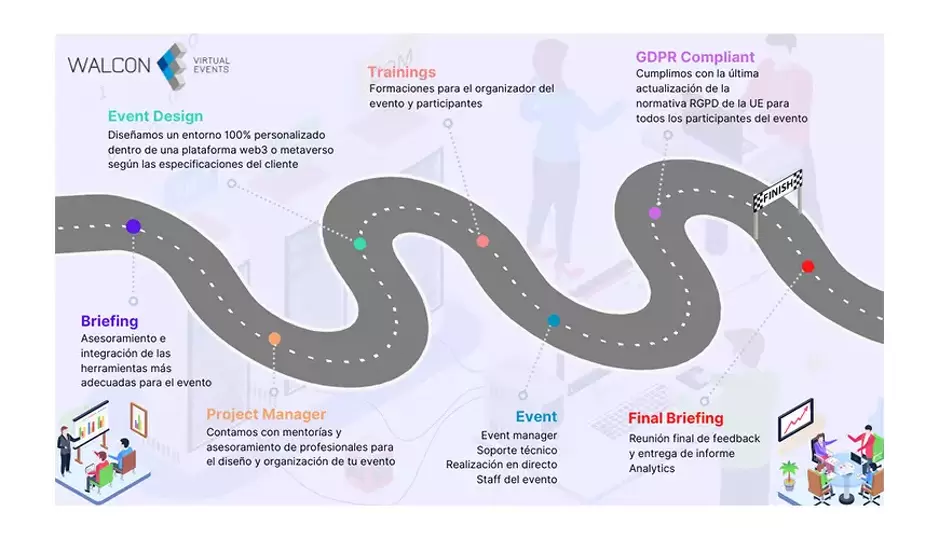

Virtual events are a real challenge for companies, public institutions and NGOs.
At Walcon we want to share our know-how of more than 4 years of experience to make your virtual event a success through these 7 steps:
1. Choose the most appropriate tools for the project
Sometimes, one virtual platform is enough, but there are more complex projects that require the integration of several platforms. It is very common to integrate applications such as Zoom, Vimeo or Youtube within a web3 platform or metaverse. It should be emphasised here that at Walcon we choose the virtual platforms that best fit the projects in a totally objective manner and we are well aware of the levels of integration between platforms.
2. Plan the project
The project manager will be in charge of advising the organising company to take into account the time margins and the scheduling of the project. It is important to be disciplined and they need to have a lot of experience in running virtual events, as the success of the event depends to a large extent on preparing everything in advance. It is also very important to know if the platform has restrictions on protected networks. In this respect, Walcon works with all types of platforms, even with platforms that do not require specific ports/IPs to be opened.
3. Configure the 2D, 3D or VR virtual space
Some platforms allow a higher level of customisation than others, so in some cases configuration may take longer.
4. Train organisers, speakers and visitors
As in the real world, speakers need to rehearse in a new environment. In addition, it is very important in the digital world that technical checks of their equipment are done at least one week before the event to avoid technical issues during the event.
5. Select the event staff
Depending on the type of platform, you will require more or less staff. What is necessary in all cases is an event manager on all platforms, and technical support on 3D platforms with avatars. There should always be a team experienced in virtual events to make sure that the event runs smoothly, as unforeseen events always happen during the event.
6. Comply with GDPR
The GDPR is one of the most secure data protection regulations in the world. At Walcon, we ensure that our suppliers comply with this regulation to protect the personal data of all participants.
7. Analyse the KPIs of the event
The organiser should receive event analytics so that he can evaluate the success of the event and compare it with the initial forecasts. In virtual events it is very common to have an attendance of 30% of the percentage of total guests, although it also depends a lot on the level of involvement of the organising entity. At Walcon we have worked on events with up to 95% attendance over total guests. You have to grab the visitor's attention, create the need for them to want to attend the event. In corporate events it is easier if attendance is mandatory.
We hope you have found this information useful. If you are interested in holding a virtual event through Walcon, you can request a meeting with us by clicking here.